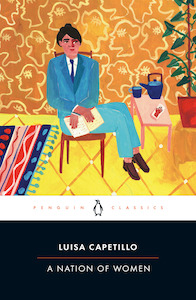
Why an Early Feminist Advocated for the Right to Divorce
Puerto Rican Activist Luisa Capetillo on the Trap of Being a Mother “Who Knows How to Do It All”
The following is from A Nation of Women by Luisa Capetillo, which first published in 1911.
*
The true mother of a family must know how to do it all, both intellectually and physically.
It is absolutely essential that she not only know how to make a dress and select the combination of colors and lace, if necessary. Indeed, she must also have talent and taste to prepare a meal from the most modest dish to the most exquisite and truffled. She should know how to prepare different desserts, from the most simple to the most refined; without getting dirty, without making a mess in the kitchen, and with utmost cleanliness. So your hands become rough or ugly? If you can, rely on some old gloves or ones you do not need. Why, useful hands are preferable to ones that are merely beautiful.
If you are fortunate enough to be with a good and loyal husband, a pair of useful hands will help you to lay the foundation for your domestic happiness. Because if you have not had any practice with which to develop your abilities with ease, the peace of the home begins to totter; a clean, proper, affectionate, indulgent, and persuasive woman will delight her husband. If he is good, attentive, and affectionate, you will make an ideal couple. If, on the contrary, he is rough, uncaring, and egotistical, try to educate him; attempt to persuade him and have the utmost patience in order to keep the peace; do not answer back with the same harshness as he does. Be as gentle and harmonious as you can be. Do not demonstrate to him that you are more reasonable, wait for him to concede, in accord with the current social system, which does not recognize that a woman can be right.
Try and be as agreeable as possible. These sacrifices can be made when the husband is home-loving, but if the suffering is too great: then seek divorce.
Likewise, I tell husbands: be patient, sweet-tempered, loving, and spend time at home, or go out, but do so with her. Otherwise, marriage is useless.
So if a companion is affectionate, all the efforts that are made to please him are not useless, such sacrifices like showing moderation and patience.
This is not true of other sacrifices that are against nature. Sacrifices should be made only when he reciprocates your affection loyally, because love is not by formulas.
These should be commitments of love, not for the sake of etiquette or acquired customs by family or social traditions.
It is hard to imagine a woman who does not know how to keep up the house, and the clothes, to maintain the house order. Yet there are indeed women who do not have these skills, who do not even know how to wash a dish, nor remove a stain from the floor, nor mend, nor cook.
What awaits them should their status change? Unpleasant experiences, grief and disillusionment.
As a general rule, women nowadays dedicate all their energy, all their attention, to their appearance; they are not concerned with anything except wearing the latest fashion; they squander all their intelligence in trying to become more beautiful, and not even in any practical way, by some beneficial and hygienic method, like practicing gymnastics, exercising in the fresh air, or swimming every morning.
But no, it must be done with ribbons and lace, by cutting their breath short from the excessive use of tight-fitting corsets. And this translates to a waste of time, health, and money.
Women must strive by all natural methods to become more beautiful, but it must be a true beauty, real and lasting, achieved by a healthy diet, without eating meat or drinking alcoholic beverages, by practicing gymnastics and taking walks in the open air, not a fictitious beauty such as that of adornment, without which she is no longer herself.
A woman should be naturally beautiful, without ridiculous adornments, beautiful because of her strong constitution, neither too heavy nor too thin; because of her sweetness of character, patience, her innocence, her honesty. All these gathered together form a precious bouquet, which every woman must preserve, without letting any one flower wilt.
In my grandparents’ time the following virtues were believed to be the most excellent and appreciable adornments for a woman:
“Silence, modesty, a retiring nature, her endless hard work, her ability to sew, and other labors that befitted her sex, her constant dedication to governing the household, her disdain for fineries and elegance. The forgetfulness or even ignorance she should show of her own beauty and skills. She should be admired by others, and should seem that she alone is unaware of this admiration. She must be gentle, natural, amiable, and prudent. Her hands must not disdain or avoid work; she must anticipate tasks and complete them on time; and her greatest source of pride is a well-ordered home. She must not compensate for her spirit and body with vain adornments.”
All of this is magnificent for the woman and mother, since it is with these qualities she will never leave her husband and children waiting while she is off perusing trinkets in a store. I agree with all of this, but now we need husbands to support their wives and aid in helping them fulfill their duties.
But if his actions cause her not to act virtuously, then there is no reason to accuse the woman only.
He must be at home with her, sharing in the difficult task of raising their children.
*
Could there exist true happiness in a marriage when the man is the only one who can regularly exercise his free will and satisfy his desires, without caring whether or not his wife agrees? Accustomed to the passive obedience of women, he does not bother to find out whether or not she is satisfied with his conduct. And if she is not, he does not attempt to please her, nor to adapt his conduct to a new way of life.
How can the holy priestess of the hearth preserve the sacred fire of love in the home when she has to officiate alone? Where is the principal object of her devotion? Look for him outside the home at those times when he should be at the side of his companion. Will a solid foundation for domestic happiness be established by this behavior? No. Men have the right to do or not do, without his companion. He goes to a masked ball or not, to the casino, to gamble, or chases other women… and meanwhile, poor woman! A sad scenario for domestic bliss! She is subjected to a sad solitude for days and nights on end, orphaned of love, of sweet attentions and joys while the above-mentioned companion gambles, dances… or falls in love.
How sad and bitter are love’s deceptions, and how long are the hours spent waiting, endless nights of waiting, always waiting…
Oh! how awful it is to wait… hours… and more hours… Days and more days… Those of you who have suffered these bitter travails that bring on such fatal consequences; when a woman lacks experience, when she does not know how to fight, alone and without friends… without diversions…
Poor woman! Poor happiness!
That loneliness either breeds deceit, perfidy, hypocrisy… or the ill-created union is broken.
Why do men keep a woman by their side at dances, at the theater, before they are married, and later when she is his companion, he leaves her alone at home and goes off with other women? Is it out of novelty? Or for the sake of variety in women? I don’t know.
How can the holy priestess of the hearth preserve the sacred fire of love in the home when she has to officiate alone?
True love does not proceed in this fashion; if a man does not feel true love for a woman, he must not sacrifice her to the firestorm of his desire, use her as a mere instrument of pleasure, that is unjust. What attraction can it offer?
Can a woman remain faithful like this, in those conditions? Apparently she can maintain her formulas and marital identity through convention, but the state of her heart, her illusions, where have they gone? Poor heart, poor illusions.
If this woman should feel attracted to another man, who during her solitude has shown her some affection, and should she end up forgetting her husband and children, who is to blame?
Could it possibly be just that this man can be unfaithful to his companion, without anyone finding him morally culpable, and that he still believes he has the right to demand fidelity of her?
As I understand it, if a man has a wife, and, to satisfy certain vices, he turns to other women and leaves the one who loves him and has been faithful to him, thereby creating a situation which moves this slave to break the chains of her slavery. If this woman, because of temperament or education, is not unwilling to age prematurely, accepting a morality she does not comprehend because it contradicts the natural law and is virtue in name only, well then, he has no right to accuse her.
Is this morality? And they have the audacity to demand this of women!
If this woman does not understand why her husband or lover always leaves her alone, because of society’s mandates, or because her pride will not allow her to understand, or because of her mother’s opinion; if she neither understands why this man, who wants his woman to be faithful, goes off with women who belong to many, lacking a faithfulness he needs to practice if he insists on demanding it from her; and if this woman in these conditions and flattered by the affection of another man, whom in her solitude she finds pleasing and who conquers her with his diligence; finding in him more affection; and following her natural impulses, she gives in to his affection and embraces this assiduous admirer, thereby exhibiting infidelity, that is an imposed morality and a violent virtue established by tyrants over woman, who for centuries have oppressed her. Does her partner, who never passes up an opportunity to be unfaithful, in the most stupid manner, have a right to punish her?
No, only in separating (did I say, in separating? But they never lived together), in never returning to her. But that is not reasonable either; why does it make him angry if his lover gives herself to another man, if he himself prefers to be with other women who give themselves to men of all classes, even ones who carry disease? This kind of morality is incomprehensible! It repulses him that his lover gives herself to a distinguished, cultured, and hygienic person, but he has no scruples about going to women when the brutality of tyrants have forced into belonging to many, and who pick up diseases; and even in becoming sick he snubs her, she who continuously waits for him, seeing him be unfaithful yet again.
What is this about? What is the type of morality that this society demands?
What right does the man have in these conditions to demand fidelity? Has he perchance bought this woman like a slave, so that she cannot manage her own affairs? If this man does not know how to fulfill his duties as a husband, or is incapable of it, why does he demand that his wife do so?
What kind of morality is this?
He has no right to accuse her. He has not separated from her in order to be unfaithful, and she fears leaving him or separating from him. To conclude, the man who is unfaithful to his wife does not love her, and if she ends up not loving him and she still does not dare to leave his side, she is stupid.
A woman has a right to separate from an unfaithful husband, and in order to do so she must know how to work if she desires to maintain her freedom. But, if before separating she has used this freedom to accept another man, her husband will be the one to trumpet that he was cheated on and he will want to portray his wife as a vice-ridden woman. If they should have children, the father is obliged to support and raise them until they are of age. The woman in this case must demand her rights and not accept any pretext that would allow her children to be taken from her.
The father has the obligation to support his children until there is a new system. But for now, there is no other.
All of us must contribute with our energies and will to substitute the obsolete traditional customs that are an obstacle to progress.
__________________________________

From A NATION OF WOMEN by Luisa Capetillo and translated by Alan West-Durán, published by Penguin Classics, an imprint of Penguin Publishing Group, a division of Penguin Random House, LLC. Copyright (C) 2021 by Arte Público Press.
Luisa Capetillo
Luisa Capetillo was a Puerto Rican activist who made significant contributions to the women’s movement and anarchist labor movements of the early 20th century—both in her native Puerto Rico and in the migrant labor belt in the eastern United States.



















